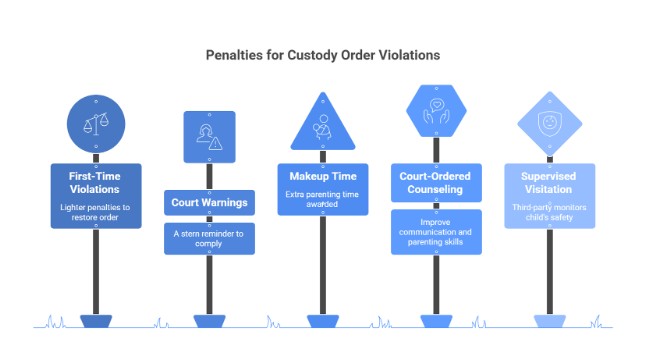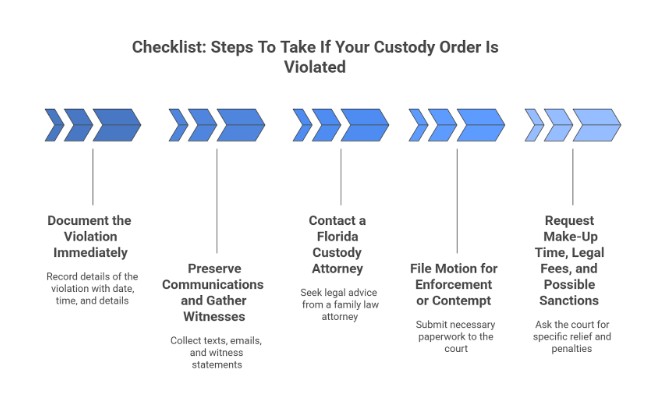
- Call for a
Confidential Consultation - 954-587-2244
- Email Us
-

Date Posted: September 8, 2025 2:07 am Author: Scott A. Levine

When a parent fails to adhere to a court-ordered custody arrangement in Florida, things can become complicated quickly.
Florida family courts take custody violations seriously—they’re not just paperwork, after all. These violations disrupt children’s lives and erode the legal system that’s supposed to protect them.
Parents who violate custody orders in Florida may face contempt of court charges, fines, jail time, mandatory parenting classes, or even lose their parental rights if the situation becomes severe.
The penalties depend on what the parent did, how often it has happened, and the extent to which it impacts the child.
Whether it’s missed visits, unauthorized moves, or other kinds of custody violations, parents need to know their options. Florida’s family law system isn’t taking these issues lightly.

A custody order violation occurs when a parent fails to comply with the terms of their court-approved parenting plan or custody arrangement. This could mean denying visitation or relocating without the permission of the other party.
Violating a custody order is basically not following the court’s custody arrangements in Florida. When the court gives you a custody order or parenting plan, you have to stick to it—no shortcuts.
Common violations include:
The court treats any action that breaks the written arrangement as a violation. Even small things like changing pickup times without agreement can get you in trouble.
Florida custody enforcement laws treat these orders as binding. Parents cannot simply change things on a whim, even if they believe it’s better for the child.
Schedule violations occur when parents fail to respect pickup and drop-off times. If the order says 6 PM on Fridays, showing up at 8 PM without permission is a violation.
Location Violations occur when parents move without obtaining court approval. Whether it’s across town or out of state, you have to follow the rules.
Communication violations include blocking calls between the child and the other parent, especially when regular contact is required.
Activity violations occur when one parent makes significant decisions without consulting the other parent. If both parents need to agree on medical care or school choices, going solo breaks the order.
Right of First Refusal Violations occur when parents fail to adhere to the agreement regarding offering extra time to the other parent before hiring a babysitter.
Levine Family Law assists Florida parents in navigating complex custody disputes with robust legal representation. If your custody order has been violated, protect your rights and contact us today.
If you’re ready to get started, call us now!

Courts hand out different penalties depending on whether it’s a first-time offense or a pattern of rule violations.
Consequences for violating custody orders can range from a warning to jail time, depending on the severity of the offense.
If a parent breaks a custody order for the first time, judges usually try lighter penalties to get things back on track. The primary goal is to resolve the issue promptly.
First-time violations might lead to:
The judge might also tell the violating parent to pay the other parent’s attorney fees. That covers the cost of dealing with the violation in court.
Sometimes, the court orders supervised visitation if they’re worried about the child’s safety. A third party must be present for every visit until the court orders otherwise.
When parents keep breaking custody orders or do something really serious, courts don’t hold back. Judges lose patience with repeat offenders.
Penalties for serious custody violations can include:
| Penalty Type | Description |
| Contempt of Court | Fines up to $1,000 and up to 6 months in jail |
| Custody Modification | Reduced parenting time or loss of custody rights |
| Criminal Charges | Felony charges for child abduction in extreme cases |
Contempt of court is the most serious offense. Parents can end up in jail if they continue to ignore court orders.
The court might also permanently change the custody arrangement. That could mean losing overnight visits or only seeing your child with a court monitor watching.
If a parent abducts the child, Florida law can bring criminal charges. Those come with possible prison time and a criminal record that doesn’t just go away.
Florida courts can modify custody orders if a parent repeatedly violates the rules. The state seeks evidence of substantial changes that impact the child’s best interest.
Florida law says you need to show a substantial and material change in circumstances before the court will change a custody order. This keeps kids from bouncing around all the time.
Judges consider the frequency and severity of the violations. Missing one visit isn’t enough, but months of denied access might be.
The violations have to impact the child’s welfare. Florida judges want to know if the violations hurt the child’s emotional, physical, or educational needs. Courts can decide a change is needed when there’s a clear pattern of problems.
Key factors courts review:
Repeated violations can result in changes to the custody arrangement. Florida courts have the power to make significant changes if a parent continues to break the rules.
The court might cut down the violating parent’s time with the child. That could mean fewer overnights or only supervised visits. In some cases, the court removes custody rights completely.
Parents who keep violating custody orders can lose parental rights for good. This usually happens when the violations are severe or the parent just doesn’t care about the court’s authority.
Possible custody modifications:
Florida courts provide parents with several options for enforcing custody orders when the other parent fails to cooperate.
You can file for contempt, ask for make-up time and legal fees, seek emergency protection if your child is at risk, or get law enforcement involved if things are severe.
If a parent violates a custody order, the other parent can file a motion to enforce the custody order in the Florida family court. This legal action requests that the court enforce the other parent’s compliance with the order.
You’ll need to file Form 12.960 and attach a certified copy of the custody order. Be sure to include details about how the other parent broke the agreement.
Florida primarily uses two enforcement tools: motions for contempt and motions to enforce. Contempt applies when someone willfully ignores a court order, like refusing to pay child support when they’re able to pay.
The court can hand out several penalties for contempt:
Parents need to show that the violation happened and that the other parent could’ve followed the order but chose not to.
The court can order make-up parenting time when one parent denies the other scheduled visits. This helps restore lost time with the child.
The parent requesting make-up time should document each missed visit, including the dates and the reason for the absence. Photos, texts, and witness statements help.
If you successfully enforce a custody order in Florida, the court often awards attorney fees. The parent who broke the order usually pays these costs.
Make-up time usually happens within 30 days of the court order. Sometimes, the court will extend future parenting time to compensate for significant losses.
It’s smart to keep detailed records of violations, like:
If a child faces immediate danger, parents can file emergency motions for urgent court help. These receive priority and can even result in same-day hearings.
Emergencies include physical abuse, neglect, substance abuse by the other parent, or threats to take the child out of state. The court may issue temporary orders to protect the child while the matter is being sorted out.
Emergency pickup orders enable law enforcement to remove a child from danger immediately. You’ll need clear evidence of immediate harm to the child’s safety.
The parent must file an affidavit explaining the emergency. Police reports, medical records, or witness statements can strengthen the case.
These emergency orders stay in place until the court holds a full hearing.
Police officers can enforce child custody orders in Florida if you show them a valid court order and proof of a violation. Law enforcement may assist in retrieving children when a parent refuses to return them.
If a parent relocates out of state without permission, things get trickier. Florida follows the UCCJEA, which covers interstate custody enforcement between states.
The UCCJEA allows Florida courts to communicate directly with courts in other states. This helps locate missing children and enforce orders across state lines.
If the other parent doesn’t return your child as ordered, contact the local police immediately. Officers need a certified copy of the custody order to act.
If it’s an international abduction, federal agencies like the FBI sometimes get involved to help bring the child back to the U.S.
If a parent is ignoring court-ordered visitation, Levine Family Law can pursue enforcement of court orders on your behalf. Safeguard your parenting time—schedule your consultation now.
If you’re ready to get started, call us now!
Good evidence is the backbone of any custody violation case. Courts want clear proof showing when, how, and why the other parent broke the order.
Text messages and emails can be powerful in court. Screenshots where the other parent refuses visits or changes plans without permission help show a violation.
Parenting apps like OurFamilyWizard create official records of all exchanges. Each message and schedule change gets timestamped. Courts like this kind of evidence because it’s hard to fake or delete.
Key digital evidence includes:
Witnesses can really boost your case. Teachers, neighbors, family, or friends who saw violations can testify. Document the violation carefully and obtain the witness’s contact information immediately.
School records can prove when a parent ignores educational decisions. Attendance records, pickup logs, and teacher notes all help. Medical records can also reveal violations of healthcare decisions.
A detailed log makes a clear timeline of problems. Write down each violation right after it happens. Jot down the date, time, what happened, and who saw it.
Essential log details:
Stick to the facts and skip the drama. Write “Parent was 2 hours late for pickup” instead of “Parent showed up ridiculously late again.” Courts want objective facts, not opinions.
Update your log every time a violation occurs. Even minor issues, when repeated, can show a bigger problem. Missed calls or late returns add up if you document them.
Keep copies of your login in different places—at home, at work, and online. That way, you won’t lose everything if something happens to the original.
Strong evidence can turn a contempt motion from a “he said, she said” mess into a solid case. Courts want proof beyond a reasonable doubt. Weak evidence? Your case might get tossed.
Organize evidence by date to show patterns. One late pickup might get excused, but 15 late pickups over two months? That proves willful contempt. Patterns matter more than one-off incidents.
Evidence hierarchy for contempt motions:
Time-stamped evidence is gold in court. Digital messages, app alerts, and official records all have timestamps, which stop arguments about when things happened.
Present your evidence in a way that’s easy to follow. Judges see a lot of cases, so clear, organized evidence makes their job easier. Label everything with dates and short descriptions.
Lawyers who handle custody enforcement cases every day spot patterns in what actually works. Quick action and experienced representation can make a significant difference for families facing violations.
Time is critical when a parent breaks a custody order. Every day you wait without taking legal steps can weaken your case and strain your bond with your child.
A family law attorney will advise you to start documenting right away. Missed visits, denied calls, broken promises—write it all down. These records often become key evidence later.
Filing quickly sends a clear signal. Courts take things seriously when parents act fast. If you wait too long, judges might wonder if the violation was really urgent.
Getting ahead of the problem can keep things from getting worse. When a parent sees quick consequences, they usually start following the order again. That means less chaos for the kids.
Levine Family Law has handled hundreds of these cases all over Florida. Their attorneys are familiar with how local judges perceive various violations.
Interstate cases get complicated. If a parent takes a child across state lines, Florida’s UCCJEA rules come into play, and experienced attorneys can navigate those extra steps smoothly.
The firm has helped bring children home after unauthorized moves. They work with police and courts in different states to make it happen.
Emergency motions are another area where they shine. Levine Family Law files emergency requests when kids are in immediate danger or when a parent completely ignores the order.
Choosing an attorney to enforce your custody rights is a deeply personal decision. Families across Florida have trusted Scott Levine not only for his courtroom skill but also for his compassion and dedication.
Here’s what former clients say:

Acting quickly when a parent breaks a custody order protects your rights and your child’s well-being. The basics: document everything, gather evidence, get legal help, file court papers, and ask for the right relief.
Write down exactly what happened as soon as you can. Include the date, time, and details about how the other parent broke the order.
Take photos if they help. Save texts, emails, or voicemails from the other parent. Keep records of missed pickups, late returns, or denied visits.
Important details to record:
If violations happen more than once, make a timeline. That pattern helps in court.
Don’t wait to write things down. Memory fades, and immediate documentation makes your case stronger if you need to take legal action.
Retain all texts, emails, phone records, and social media posts related to the violation—screenshot messages before they disappear.
Obtain contact information from anyone who witnessed the violation. This could mean teachers, family, neighbors, or daycare staff.
Ask witnesses to jot down what they saw while it’s still fresh. Have them sign and date their statements—it’s just easier that way.
Types of evidence to collect:
Don’t delete anything, even if it feels unimportant. Back up all your evidence in a couple of different places.
Communication records often say the most. They can reveal intent and show patterns that might not be apparent at first.
Contact a family law attorney who is familiar with Florida custody cases. Many offer a free consultation to look over your situation.
An experienced attorney can walk you through your legal options and explain how Florida’s custody enforcement laws work. They are aware of what local judges typically do with these cases.
Bring all relevant documentation and evidence to your meeting. It really helps the lawyer give you solid advice.
Questions to ask your attorney:
Don’t try to handle big violations on your own. Legal action may be necessary if a parent fails to comply with court orders.
Some situations need immediate court action. Your attorney can file emergency motions to protect your child if things get urgent.
Your attorney files the right paperwork to address the violation. Usually, that’s a Motion for Enforcement or a Motion for Contempt of Court.
The motion informs the judge exactly how the other parent has violated the custody order. All your evidence and witness statements go in there.
The court will set a hearing. Both parents have the opportunity to explain what happened, and the violating parent must account for not following the order.
Common types of motions:
Organize your evidence in a clear and easy-to-follow manner. Practice telling your story in plain language—judges appreciate that.
The judge reviews the facts and decides if the custody order was willfully violated and what should happen next.
Ask the court for specific relief to rectify the damage caused by the violation. This could mean make-up parenting time you missed.
Request that the other parent pay your attorney fees and court costs. Florida courts often order this if someone willfully breaks a custody order.
Consider asking for sanctions against the violating parent, such as fines, community service, or parenting classes.
Types of relief to request:
Be clear about what you want the court to order. Vague requests usually don’t get far.
The court has several options for addressing violations. Judges can impose consequences based on the severity and frequency of the non-compliance.
Focus on what’s best for your child when you ask for relief. Courts always prioritize the child’s well-being.
When custody violations threaten your child’s well-being, Levine Family Law provides trusted divorce litigation and family law guidance. Take the next step to protect your family—contact us today.
What happens if a parent violates a custody order in Florida?
If a parent violates a custody order in Florida, the court may hold them in contempt. Penalties can include fines, attorney’s fees, make-up parenting time, mandatory parenting classes, or even jail for repeated violations.
Can custody be changed if a parent repeatedly violates a Florida custody order?
Yes. If one parent repeatedly violates a custody order, Florida courts may consider it a “substantial and material change in circumstances.” This can justify modifying custody to ensure the child’s best interests are protected.
Can police enforce a custody order in Florida?
Police generally do not enforce custody orders unless there is an immediate threat to a child’s safety or evidence of abduction. Custody enforcement is usually handled through the family court system.
What evidence do I need to prove a custody violation in Florida?
Proper evidence includes text messages, emails, call logs, parenting app records, school attendance records, and witness statements. Courts in Florida value consistent documentation of missed visitation or interference with communication. Maintaining a written log of violations, along with supporting evidence, can significantly strengthen a motion for enforcement.
Can a parent go to jail for violating a custody order in Florida?
Yes. A parent who willfully disobeys a custody order may be jailed for contempt of court, especially after repeated violations. While jail is typically a last resort, courts may impose short-term incarceration when fines, parenting classes, or supervised visitation fail to ensure compliance with the terms of the order.
How do I enforce a custody order in Florida?
To enforce a custody order, the complying parent can file a Motion for Civil Contempt/Enforcement under Florida Family Law Rule 12.615. The court may award make-up parenting time, legal fees, and sanctions against the parent who violated the order. In urgent cases, emergency motions or law enforcement involvement may be necessary to ensure the child’s protection and safety.
What are the long-term effects of violating a custody order in Florida?
Long-term consequences can include permanent changes to custody, loss of visitation rights, supervised parenting time, and financial penalties. Courts also consider the impact on the child’s emotional well-being when determining sanctions.
Proudly Serving All Areas Of: